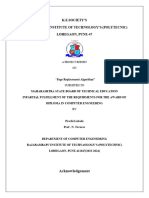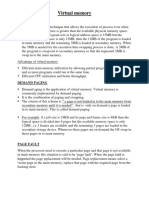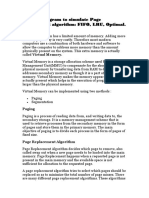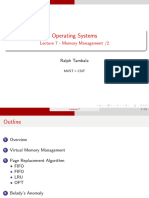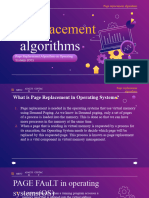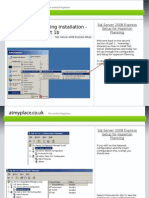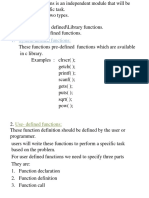Page Replacement Algorithms
Concepts, Types, Detailed Analysis,
and Comparison
Introduction
• What is Page Replacement?
- Memory management technique for deciding
which pages to swap out
• Importance: Optimizes memory use, especially
in high multitasking systems
• Goal: Minimize page faults while optimizing
system performance
Importance of Page Replacement
Algorithms
• • Allows systems to handle larger processes
than available physical memory
• • Balances memory and disk I/O operations
• • Helps reduce page faults, ensuring smooth
execution
Basic Concepts
• Page Fault: A process requests a page not in
memory
• Page Frame: Fixed-size slot in main memory
for holding a page
• Page Hit and Miss:
• - Hit: Page is in memory
- Miss: Page must be loaded from disk, causing
a page fault
First-In-First-Out (FIFO) Algorithm
• Removes the page that has been in memory
the longest
• Pros: Simple and easy to implement
• Cons: Can cause Belady's Anomaly, increasing
page faults
• Example: Illustrate with a sequence of pages
and frame replacements
Least Recently Used (LRU) Algorithm
• Tracks the least recently accessed page and
replaces it
• Pros: Often better than FIFO
• Cons: Requires tracking page access history,
which is memory-intensive
• Example: Sample page replacement scenario
with LRU
Optimal Page Replacement Algorithm
• Replaces the page not used for the longest
time in the future
• Pros: Provides the lowest possible page fault
rate
• Cons: Impractical, as it requires future
knowledge
• Example: Minimizing page faults with this
ideal algorithm
Least Frequently Used (LFU) Algorithm
• Replaces the page with the lowest access
frequency
• Suitable for applications with stable access
patterns
• Cons: Can retain 'stale' pages used frequently
at the start
• Example: LFU replacements in a sample
scenario
Comparison of Page Replacement
Algorithms
• FIFO: Simple but may increase page faults
(Belady’s Anomaly)
• LRU: Reduces page faults but has tracking
overhead
• Optimal: Ideal but impractical for real-time use
• LFU: Best for stable patterns but may keep
outdated pages
• Table: Side-by-side comparison based on
efficiency, overhead, and suitability
Applications and Real-World Use Cases
• Operating Systems: Used in memory
management in Windows, Linux, etc.
• Database Systems: Essential for high
transaction volume databases
• Embedded Systems: Critical in memory-limited
environments
Conclusion
• Page replacement algorithms optimize
memory use and system performance
• Choice of algorithm depends on system
requirements and access patterns
• Advances in algorithms aim for more efficient,
high-performance solutions
References
• OS textbooks, academic papers, and online
resources on memory management
• Research articles on operating systems and
page replacement algorithms

